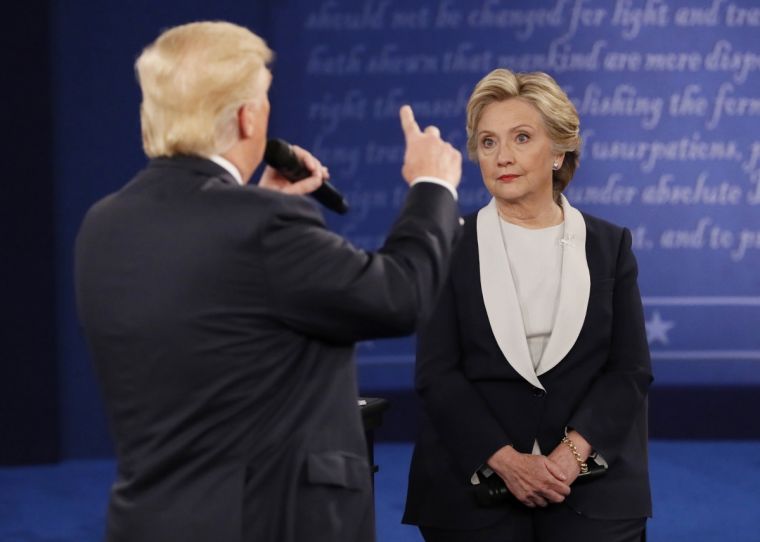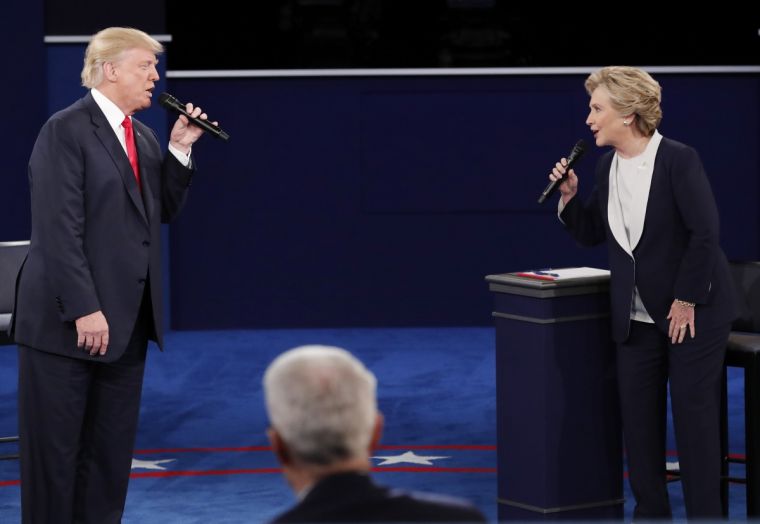For How Much Longer Will Christians Support Donald Trump?

The Daily Mail summed up the media consensus, calling it, "Trump's great escape".
And it may be true that the defiant Republican – whose campaign has hit a crisis over a 2005 tape in which he makes highly offensive and lewd remarks about women – came out fighting in the second of three televised debates last night.
Calling Hillary Clinton a "devil" and gaining a laugh for saying "you'd be in jail" under a Trump presidency, in the petty world of debating points, he undeniably landed some blows.
But beneath the surface, Donald Trump's campaign appears finally to be coming off the rails. As Asian shares and the Mexican peso crept higher today, there were signs that the markets saw less chance of a Trump victory.
At the same time, albeit in drip-drip form, some Christian voices were joining a range of Republicans disassociating from Trump and calling on him to step down for what the candidate last night again claimed was merely "locker room talk".
Just hours before the highly charged debate in St Louis, Missouri, the evangelical theologian Wayne Grudem performed a spectacular U-turn and posted an essay online that declared: "There is no morally good presidential candidate in this election." He wrote: "I previously called Donald Trump a 'good candidate with flaws' and a 'flawed candidate' but I now regret that I did not more strongly condemn his moral character. I cannot commend Trump's moral character, and I strongly urge him to withdraw from the election."
Meanwhile Russell Moore, the president of the Ethics and Religious Liberty Commission, the public policy arm of the Southern Baptist Convention, called continued evangelical support for Trump a "disgrace and a scandal."
He said on Saturday: "The damage done to the gospel this year, by so-called evangelicals, will take longer to recover from than the '80s TV evangelist scandals."
Also on Saturday, the US Catholic advocacy group CatholicVote.org issued a statement describing Trump's taped comments as "disgusting and simply indefensible," adding: "Catholic voters rightly will be unnerved by these developments."
The statement went on: "In our own opinion the viability of Donald Trump's candidacy is now in question. Furthermore, the good many hoped to achieve, in spite of Trump's many well-known flaws, is also now in doubt. If Donald Trump is unwilling to step aside, the Republican National Committee must act soon out of basic decency and self-preservation."
Nonetheless, some prominent Christian leaders, perhaps with a vested interest, are choosing still to support Trump. Ralph Reed, the head of Trump's religious advisory board, told CNN: "I've listened to the tape. My view is that people of faith are voting for president on issues like who will defend and protect unborn life, defund Planned Parenthood, grow the economy and create jobs, oppose the Iran nuclear deal...I think a 10-year-old tape of a private conversation with a TV talk show host ranks pretty low on their hierarchy of their concerns."
Franklin Graham wrote on Saturday that Trump's "crude comments more than 11 years ago cannot be defended." But neither, he said, can the "godless progressive agenda" of Clinton. This no-win position appeared to sum up that of a majority of Christian voices today.
As in the last debate, there was no reference to God or faith last night, but this time, the subtext was all about morality and character.

Clinton and Trump declined to shake hands at the start, a sign of things to come in one of the most personal and brutal sets of exchanges by US presidential candidates in living memory.
But it was Trump who dominated, as Clinton chose a more passive approach, perched mainly on her stool as Trump roamed ominously around her. Clinton may have wanted to appear bullied, and she certainly was, as Trump railed against her use of emails and the private life of her husband and former president Bill.
Clinton did score with her claim that the taped remarks did reflect Trump's character. "He has said the video doesn't represent who he is but I think it's clear to anyone who heard it that it represents exactly who he is," she said.
Aside from a question over the taped remarks, the debate centred on taxes, healthcare, US policy in the Syrian civil war and Clinton's comments that half of Trump's supporters belonged in a "basket of deplorables".
And astonishingly, it was Clinton who ended up on the back foot, apologising, saying she was "sorry" about that description and stressing that her problem was with the candidate not his supporters.
But the highlight for Trump came early in the 90-minute debate, when he said – though "I hate to say it" – that he would appoint a special prosecutor to investigate Clinton's operation of a private email server during her tenure as President Barack Obama's secretary of state from 2009-2013. Clinton responded: "You know it's just awfully good that someone with the temperament of Donald Trump is not in charge of the law in this country." But, to the biggest laugh of the debate,Trump shot back: "Because you'd be in jail."
However, on policy Trump seemed much less sure of himself. Surprisingly, he dismissed a statement from his vice-presidential running mate, Mike Pence, last week in which Pence said that the US should be prepared to intervene militarily in Syria. "He and I haven't spoken, and I disagree," Trump said. There are now rumours that Pence, a Catholic-turned-evangelical, may pull out of the joint ticket with Trump, though he may have missed his chance for that, and Pence expressed support for Trump after the debate.
Towards the end of the encounter, which was jointly chaired by Anderson Cooper of CNN and Martha Raddatz of ABC, the candidates were asked to name something they admire about their rival. Clinton cited Trump's "able" children and Trump praised the way in which Clinton is a fighter who "doesn't quit". Finally, when it was over, they shook hands.
A CNN/ORC snap poll of debate watchers found that 57 per cent thought Clinton won, versus 34 per cent for Trump.
But the media consensus appeared to be that Trump had given his controversial campaign a lifeline.
Still, even now, Trump's survivability must not be underestimated.
Whether or not further Christian voices come out against him remains to be seen. They could prove the tipping point.
But the question today, surely, is why so many evangelicals still, in good conscience, support this man.











